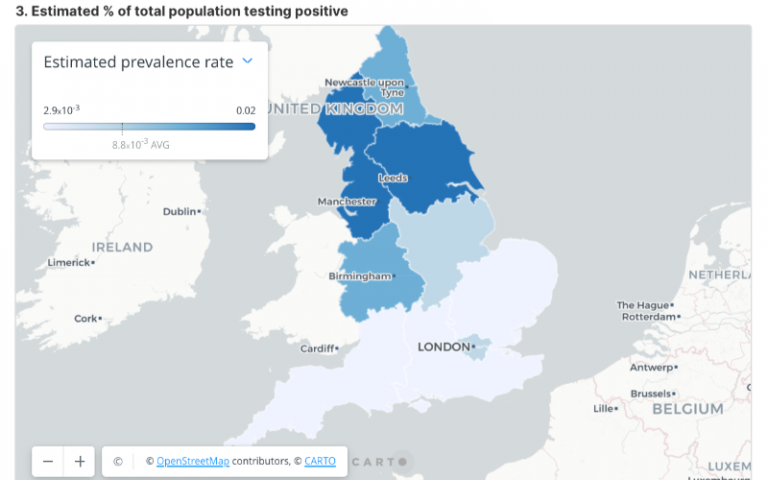New COVID-19 dashboard highlights gaps in data needed to address pandemic
28 October 2020
A new public health data visualisation dashboard for COVID-19 has revealed significant issues regarding the quality, consistency and availability of reliable data needed to manage the Coronavirus pandemic and its impacts.

Developed by researchers at UCL-led interdisciplinary research collaboration i-sense, the dashboard highlights significant gaps in both data quality and availability. Placed in the context of total number of estimated infections, the proportion of cases whose contacts are asked to isolate is small. Further, no routine data are collected on how well requests for 14-day isolation are adhered to. This makes it impossible to currently assess how effective NHS Test and Trace is in reducing COVID-19 transmission.
Made available to the public today, the i-sense COVID Response Evaluation Dashboard (COVID RED) collates and presents data from the Office of National Statistics, Public Health England, and the NHS under five categories; Find, Test, Track, Isolate and Support for those asked to Isolate (FTTIS). It presents indicators of England’s performance under each of these headings, and identifies areas where more data are needed.
Bringing together COVID-19 data from a wide range of sources into one programme, COVID RED is currently the only dashboard that explores the system as a whole, with the additional function of ‘isolation’ and ‘support’ status. This is in regard to the importance of these steps in ensuring optimal performance of the whole response system.
COVID RED co-developer Professor Christina Pagel (UCL Mathematics & Physical Sciences) said: “Increasing volumes of data are being shown in the media and in government press conferences as a basis for local tightening of restrictions. However, these data are often from disparate sources, and are not linked together to give a more complete picture of how we are doing. This was the motivation behind our dashboard development. We wish to contribute to the public understanding of COVID-19’s spread, and support policymakers in identifying current areas of the Find, Test, Trace, Isolate and Support structure requiring strengthening.”
The researchers note that gaps in information regarding follow up of confirmed COVID-19 cases is an issue; at present, the number of people isolating with symptoms in England is unknown, and there is a lack of data on those who need or are receiving any kind of support.
Furthermore, the best available data for some areas of the dashboard is up to two weeks old; the team emphasise the need for real-time information to be prioritised to inform and support the necessary responses, including regional or local lockdowns.
The release of the dashboard to the public comes as the UK enters a three-tiered system of local alert levels, with Liverpool, Greater Manchester and Lancashire under tier 3 restrictions similar to national lockdown in March, with other areas likely to follow. There are also demands for a national ‘circuit breaker’ in light of the increase of infections in virtually all areas of the UK.
The research team hope that the dashboard can be used to identify any stages in the Find, Test, Track, Isolate and Support system that need urgent improvements, and enable more informed public discussion.
COVID RED co-developer Professor Deenan Pillay (UCL Infection & Immunity) said: “Coronavirus case numbers are doubling every two weeks at the moment, and access to real-time data will be essential during this time to monitor ‘hot-spots’ of infection as we head into winter so that local health authorities can better control community spread. Indeed, an effective local public health approach is key to ensuring we avoid the need for regular lockdowns. Track, Trace, Isolate’ is a key part of monitoring the effectiveness of social distancing measures, and to ensure infections remain low once we come out of current and future restrictions.”
The COVID RED dashboard was developed by researchers within the EPSRC funded Interdisciplinary Research Collaboration, i-sense. The dashboard project was led by Dr Mengdie Zhuang, alongside co-developers Professor Ed Manley, Professor Deenan Pillay, Jobie Budd, Dr Isabel Bennett, Professor Rachel McKendry, Professor Christina Pagel, Steven Gray, Dr Nigel Field, and Rebecca Sconza, with support from Erin Manning and Oscar Bennett.
Links
• The COVID RED Dashboard
• Professor Deenan Pillay's academic profile
• Professor Christina Pagel's academic profile
• i-sense
• UCL Faculty of Medical Sciences
• UCL Faculty of Mathematics & Phsyical Sciences
Image
• Image: i-sense COVID Response Evaluation Dashboard
Media contact
Evie Calder
Tel: +44 20 7679 8557
E: e.calder [at] ucl.ac.uk
 Close
Close

